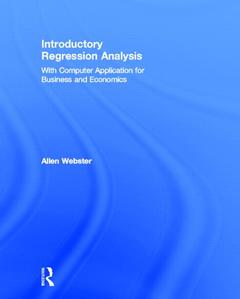Description
Introductory Regression Analysis
with Computer Application for Business and Economics
Author: Webster Allen
Language: English
Subjects for Introductory Regression Analysis:
Keywords
Predictor Coef SE Coef; regression analysis; business statistics; quantitative methods; decision sciences; business math; Regression Model; Data Set; Dummy Variables; Double Log Model; Minitab Output; SS SS; Error Term; Auxiliary Equation; Time Series; Exponential Smoothing; Glejser Test; OLS Estimate; RHS Variable; Reduced Form Equations; Double Exponential Smoothing; LAGRANGE Multiplier Test; Single Exponential Smoothing; Distributed Lag Models; LPM; Durbin Watson Statistic; Durbin Wu Hausman Test; Cochrane Orcutt Method; Successive Error Terms; Coefficients Standard Error
Publication date: 01-2013
Support: Print on demand
Publication date: 01-2013
280 p. · 20.3x25.4 cm · Paperback
Description
/li>Contents
/li>Biography
/li>
Regression analysis is arguably the single most powerful and widely applicable tool in any effective examination of common business issues. Every day, decision-makers face problems that require constructive actions with significant consequences, and regression procedures can prove a meaningful and valuable asset in the decision-making process. This text is designed to help students achieve a full understanding of regression and the many ways it can be used.
Taking into consideration current statistical technology, Introductory Regression Analysis focuses on the use and interpretation of software, while also demonstrating the logic, reasoning, and calculations that lie behind any statistical analysis. Furthermore, the text emphasizes the application of regression tools to real-life business concerns. This multilayered, yet pragmatic approach fully equips students to derive the benefit and meaning of a regression analysis.
This text is designed to serve in a second undergraduate course in statistics, focusing on regression and its component features. The material presented in this text will build from a foundation of the principles of data analysis. Although previous exposure to statistical concepts would prove helpful, all the material needed for an examination of regression analysis is presented here in a clear and complete form.
1. Review of Basic Concepts 2. An Introduction to Regression and Correlation Analysis 3. Statistical Inferences in the Simple Regression Model 4. Multiple Regression: Using Two or More Predictor Variables 5. Residual Analysis and Model Specification 6. Using Qualitative and Limited Dependent Variables 7. Heteroscedasticity 8. Autocorrelation 9. Non-Linear Regression and the Selection of the Proper Functional Form 10. Simultaneous Equations: Two Stage Least Squares 11. Forecasting with Time Series Data and Distributed Lag Models
Allen Webster is a Professor at Bradley University. He gained his Ph.D. in Economics from Florida State University, and both an M.S. and B.S. in Economics from Fort Hays State University.
These books may interest you

Applied Regression Modeling 125.33 €



